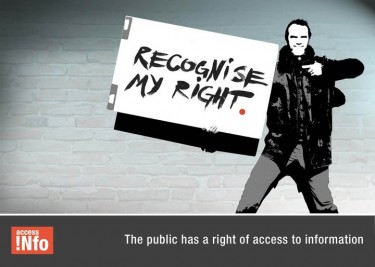It is not always easy to obtain information, data and documents from public administrations, despite the fact that the information in their hands belongs to the citizens. In practice, accessing information has many obstacles that violate international treaties like the Council of Europe Convention on Access to Official Documents and more than 93 laws on access to information in the world.
This is one of the motives for which some civil society organizations, dedicated to pro-transparency activism, have launched a series of online platforms that allow people to request information from public institutions. In Europe, AsktheEU.org‘s main purpose is to process requests to European institutions while Your right to know [es], created and managed by the NGO Access Info Europe in collaboration with Fundación Civio [es], centers on Spanish institutions. The platform allows any citizen to send information requests directly to the desired administrations whether they be local, autonomous, or national. The idea came from British website WhatDoTheyKnow?, created by MySociety and based on free software called Alaveteli. Similar tools exist in Brazil, Germany, Chile, Kosovo, and Uruguay, with the recently debuted What do you know? [es].

With these applications, the information requests that each person sends to institutions are public. This permits anyone to follow the request and see the corresponding response. The system allows, among other things, public institutions to save time by not having to answer the same requests multiple times, and also helps the actual users who do not have to wait for an answer to a question that has already been asked. It therefore improves the system of transparency and makes it more efficient. The user has the opportunity to indicate if the answer was satisfactory or not and can even provide a resource in case he or she did not obtain the information requested by the deadline set for it.

Graph with results of Astheeu.org platform after one year.
The results vary from one country to the next depending on the national laws implemented for access to information. In Spain, the legislation excludes a lot of information from the scope of the law and permits administrative silence, which is to say that if they do not respond, the request is considered denied. Spain is the only country in the European Union with a population of over 1 million that does not have a transparency law (except regarding environmental material). Although the bill is currently awaiting amendments in the Parliament, experts who have already analyzed it consider it insufficient, and that it is below international standards [es]. If the text of the Transparency Law is approved as it stands, no major changes to the current lack of transparency will be made.
There are other similar initiatives that, like those mentioned previously, take advantage of the Internet to put it at the service of access to information, demand the right to know, and create an incentive for institutions’ accountability. In this sense, TweetyourMEP as well as Tweetminster and TweetCongress facilitate the possibility of sending messages via Twitter to representatives of the European Union or other politicians, whom the users want to speak to.

Access to information is a fundamental right linked to freedom of expression. Information is the key to forming public opinions and, as such, to citizenship participation in the decision making process. Institutions must answer the requests not only out of obligation but also to regain citizen confidence in those that represent them. If institutions were more transparent and accountable for their actions, the gap between the two would improve notably. A CIS study [es] pointed out that the third problem for one in four Spaniards is political management. It is no coincidence that this occurs in Spain, taking into account that this country does not apply Article 10 of the European Convention on Human Rights which protects “the freedom to receive or communicate information or ideas.” In April 2009, the European Tribunal on Human Rights recognize that the right to freedom of expression specifically includes the right to access to information [es] in the hands of public entities.
In the following video, the director of the NGO Access Info Europe, Helen Darbishire, explains how and why to use the Asktheeu.org platform:








1 comment